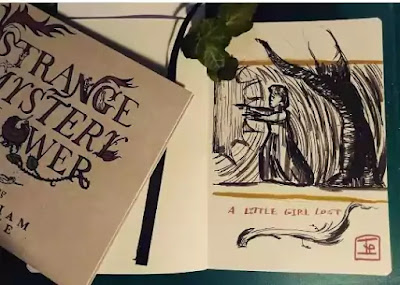Also Read
A Little Girl Lost
Summary and Analysis
Introduction:
'A Little Girl Lost' is a poem about a girl lost to her father since she thwarts him and makes love with a young man. In this poem Blake presents the father as a person who denies his daughter the freedom to love and lead a happy life with her lover. The poet, at the beginning itself, addresses the coming generation and narrates an incredible event to them. Here too the elements of 'experience' lay their oppressive hands on the protagonist. The initial cadence of 'innocence' subsides into a dreary silence and terror as the poem proceeds and comes to its end.
 |
| A Little Girl Lost |
Summary:
Perhaps we find a similarity between the father of 'A Little Girl Lost' and the Nurse in the 'Nurse's Song' in Songs of Experience. The nurse grows pale at the sight of the children and turns jealous at their lucky lot. 'A Little Girl Lost' is more intense because the father who resents his daughter's love-making is not merely pale or green, he rages and boils in anger. He is the agent of 'Experience' who unnerves the little girl. The idea that the poet wants to unravel is that people are afraid of doing things openly and hypocrisy has become the accepted code of conduct. The erroneous concept of chastity strangles innocent joys and sincerity. Ona's father curses and calls her a "dismal care" who "shakes the blossoms of his hoary hair" for indulging in free love and not binding her natural impulses.
Blake's Concept of Love:
Admittedly, the poem brings out Blake's ideas on love and hints at his well-known belief that sex is not sinful. For Blake nakedness is a symbol of pure innocence and he lauds uninhibited love. The Golden Age is that in which the people have love for their fellowmen and mingle with one another freely. In the Golden Age love is not a crime but a grace and beauty signalling unbridled innocence. But in the present age the most tender sentiments are frozen by the 'trembling fear' coming from the cruel eyes of experience.
The Loving Look:
Ona is not to be thought of as a single person suffering the threats of her father. She represents all men and women of all times. Her nervous breakdown is brought about by a single look from her father's eyes. All through the poem we sense intermittent deviation from past to present and present to past. In the second stanza, for instance, the poet employs the past tense in order to stress the fact that by the end of the poem Ona is divested of her innocence. But this loss is not because of her physical experience but because of a single loving look." In the third stanza (the introductory lines of the poem addressing posterity is not counted as a stanza here). Blake again turns to the past tense after the second line and in the fourth stanza we find him using present tense and the fifth reverts to the past. Thus the tenses overlap to embrace time as a whole and to extend its effect to the present too. So it may be called a timeless story.
The story can be seen to have a distant echo of the life of Adam and Eve in Eden. When Adam and Eve ate the forbidden fruit (that is to say, they experienced sexual life) God resented it and expelled them from Paradise. The story of the Fall is modified to produce the effect the poet intends. The difference in the modified version is that only the girl confronts her father and the lover is nowhere on the scene. Thus the poet wants to establish that Eden is enacted in every person's experience.
Sex is Sinful:
The poem communicates the fall of the girl. Ona falls from her purged world of innocence into the realm of guilty conscience. This happens not when she indulges in love-making with her lover, but when her father makes her feel guilty of her act. She is forced to see sex as sinful and forbidden. The father is one who holds love to be a crime. Ona falls into the corrupt hypocritical contemporary world as she is infected by the sense of guilt associated with sexual matters. Blake rouses the conscience of posterity to share his bitter indignation at the heavy oppression laid on human instincts such as love and affection.
The Father and the Daughter:
Ona's father is under the misapprehension that something vicious has happened and his terrifying and suspicious look enervates her long before she dares to speak. Naturally, she trembles with grim horror. The father's look is 'like the holy book,' wrought with the awful repressions conferred upon him by the fallen man to check his distorted impulses. We may rightly presume that 'Thou shalt not' is written on the face of the father as well as in the Bible. Confronted by him, Ona feels guilty and takes it for granted that she has committed some sin most foul. Afterwards, she is not the same girl who had agreed to meet her lover again in the fields under the light of innocence. Though the meeting may take place, her guilty conscience is likely to infect her lover too.
The father belongs to the, category of Experience' where hypocrisy, corruption, slavery or thraldom, negation of natural instincts and powerful tyranny dominate over immaculate innocence.